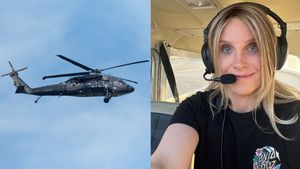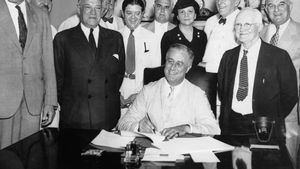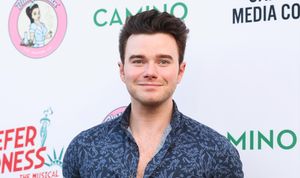Welcome to How Gay Is It? Out’s review series where, using our state-of-the-art Eggplant Rating System, we determine just how queer some of pop culture's buzziest films and TV shows are! (Editor’s note: this review contains mild spoilers for The Bikeriders.)
The summer of threesomes heats up in The Bikeriders (okay, foursome if you count the motorcycles as characters). Based on a photo-book of the same name by Danny Lyon, director Jeff Nichols brings us an ode to chopper culture.
The film is told through a series of interviews from photojournalist Lyon (played by an MVP of the summer ménage à trois, Challengers star Mike Faist) with biker-bride Kathy (Jodie Comer). Through her best attempt at some sort of midwestern accent, we are woven the tale of the founding and evolution of the Vandals Motorcycle Club. Established by Johnny (Tom Hardy), what started as a bike racing group quickly evolves into a club and family. Rounding out the core crew are Zipco (Michael Shannon), Cal (Boyd Holbrook), Brucie (Damon Herriman), Cockroach (Emory Cohen), Wahoo (Beau Knapp), and Corky (Karl Glusman). Then there’s Benny (Austin Butler).
Benny is the embodiment of being born to be wild. Butler attempts to play him with bad boy aloofness. Spanning the '60s and '70s, the film takes a meandering route through the ups and downs of the club and its quirky members. And yet, it fails to ever really shift into high gear.
 Mike Faist/Focus Features
Mike Faist/Focus Features
While we applaud Hardy, who could probably have played this role in his sleep, the other performances feel more like individual acting showcases than a cohesive group. The most interesting part is the push/pull between Comer, Butler, and Johnny (representing the club and motorcycle culture in general). The tension between Comer’s Kathy (married to the reckless Benny) and Johnny over Benny never really comes to fruition in a meaningful way.
There are plenty of films out there with morally ambiguous protagonists, so that’s not what stopped us from investing in these characters. By employing the “told through an interview” device, the film is particularly guilty of telling us, instead of showing us.
Fans of motorcycle culture will likely find something to admire in the film. Instead of the male or female gaze the camera operates through the moto gaze (though even that is muted). We could’ve maybe understood if it was a love letter to bikes, yet it doesn’t even indulge in that. It stays surface level, leaving the viewer itching for it to do something more (and nobody likes being left with an itch).
 Kyle Kaplan/Focus Features
Kyle Kaplan/Focus Features
Now for the question we at Out thoroughly investigate: How gay is it?! Throttled gay. As a whole, the film contains limited sexuality. Aside from the aforementioned moto gaze, there IS a tiny bit of smoldering gaze directed at Butler.
There is also, of course, the grease monkeyed up eye candy of some of the leads. Though others in the film get hit with an aggressive hair and makeup ugly stick (what did they do to you Norman Reedus?!) to try to make them seem grittier.
What was the most befuddling narrative to us was the attempt to paint the bikers as a marginalized group. Though we acknowledge that, at the time, they were probably on the fringe of society, the group consists almost entirely of white cis-het men. The way the characters talk about themselves is as if they’re from a community who is persecuted because of factors they CANNOT choose. Versus these bikers who are members of the group that is, quite frankly, at the top of the social food chain at the time. While era appropriate for the '60s/'70s, the homogeneity of the characters in the film (and abject failure of the Bechdel test, though we didn’t have high hopes for that here), asking us to sympathize with them feels out of place in a film in the 2020s.
We honestly expected a bit more from Nichols, who in the past has shown a complex understanding and allyship in exploring marginalized groups in films like Mud and Loving.
 Kyle Kaplan/Focus Features
Kyle Kaplan/Focus Features
As a whole we give the film a 3 out of 5. It’s ambling and bloated, but the moments Hardy is on screen have an intensity that saves the film from being a brittle waste. As for how gay it is, we also give it a three(some) out of 5. Centering so much of it around the battle between Comer and Hardy for Butler’s Benny puts it squarely in love triangle territory. For something that did have such homoerotic (or at least homoplatonic) potential, the film was so devoid of chemistry that it may leave you feeling as withered as if you’d hit the open road without a helmet and some SPF.

The Bikeriders hits theaters on Friday, June 21.



































 Mike Faist/Focus Features
Mike Faist/Focus Features Kyle Kaplan/Focus Features
Kyle Kaplan/Focus Features Kyle Kaplan/Focus Features
Kyle Kaplan/Focus Features























































Cooper Koch and twin bro spark controversy with eye-popping 'White Lotus' parody